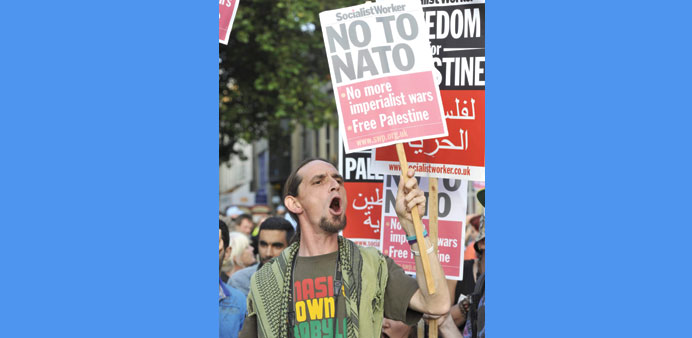Demonstrators make their ‘No to Nato’ declaration while the Nato summit in nearby Newport takes place, opposite the castle in Cardiff, Wales, yesterday. World leaders from about 60 countries are coming together for a two-day summit.
Reuters/Newport, Wales
Nato demanded yesterday that Moscow withdraw its troops from Ukraine as US President Barack Obama and his Western allies vowed to support Kiev and buttress their own defences against Russia in the biggest strategic shift since the Cold War.
Nato leaders made clear at a summit in Wales that their military alliance would not use force to defend Ukraine, which is not a member, but planned tougher economic sanctions to try to change Russian behaviour in the former Soviet republic.
The two-day meeting was marked by the most serious east-west standoff since the fall of the Berlin Wall 25 years ago and the collapse of the Soviet bloc, as well as alarm at territorial gains by Islamist insurgents in Iraq and Syria.
Western officials voiced deep caution about Kremlin talk of an imminent ceasefire in a five-month-old armed revolt by pro-Russian separatists in eastern Ukraine, timed just as Nato was meeting and the European Union was preparing new sanctions.
Previous such statements had proved to be “smokescreens for continued destabilisation of Ukraine”, Nato Secretary-General Anders Fogh Rasmussen told reporters after the 28 leaders met Ukrainian President Petro Poroshenko.
“We call on Russia to end its illegal and self-declared annexation of Crimea,” Rasmussen declared. “We call on Russia to pull back its troops from Ukraine and stop the flow of arms, fighters and funds to the separatists. We call on Russia to step back from confrontation and take the path of peace.”
German Chancellor Angela Merkel said the West was prepared to lend weight to those demands with further sanctions but also to talk to Moscow about a political solution.
Poroshenko, whose forces have suffered a string of setbacks in the last week, told reporters he would order a ceasefire today if an agreement on a peace plan to end the war in eastern Ukraine is signed at talks in the Belarus capital of Minsk.
“The only thing we need now for peace and stability is just two main things: first, that Russia withdraw their troops, and second, to close the border,” the Ukrainian leader said, adding he was cautiously optimistic about Friday’s peace talks.
A Nato military officer said Moscow had “several thousand” combat troops and hundreds of tanks and armoured vehicles operating in Ukraine. The Kremlin denies it has any forces fighting alongside the rebels.
The White House said Obama and leaders of Germany, France, Britain and Italy agreed on the sidelines of the summit that Russia should face “increased costs” for its actions.
French President Francois Hollande said tougher EU sanctions, due to be adopted today, would depend on events in the coming hours. Diplomats said there was little chance of them being derailed, even if a ceasefire were signed.
The Nato leaders also discussed how to tackle Islamic State militants who have captured swathes of Iraq and Syria, posing a new security threat on the alliance’s southeastern flank, and how to stabilise Afghanistan when Nato’s combat mission there expires at the end of the year.
Poroshenko’s forces were battling to cling to the key port of Mariupol on the Sea of Azov, which is vital to Ukrainian steel exports. Explosions were heard close to the city, halfway between Crimea and Russia.
The Ukrainian leader sought arms and training for his armed forces from Western partners as well as political support against Russian President Vladimir Putin. He hinted that several Nato countries had agreed to provide lethal or non-lethal military equipment but gave no details.
Poroshenko avoided public talk of reviving Ukraine’s bid to join Nato which had reopened a rift among the allies. Obama said in Estonia on Wednesday that the door to membership would remain open to states that meet Nato standards and “can make meaningful contributions to allied security”, but France and Germany remain opposed to admitting Kiev, fearing it would exacerbate tension with Moscow and could suck them into a war.
Russian Foreign Minister Sergei Lavrov underlined Moscow’s opposition to Ukraine joining Nato, warning that attempts to end the country’s non-aligned status could harm security. He accused the US of supporting “the party of war” in Kiev.
After a week of defiant statements from Putin, Lavrov said Russia was ready for practical steps to de-escalate the crisis and urged Kiev and the rebels to heed ceasefire proposals put forward by Moscow on Wednesday.
As more than a decade of inconclusive Nato-led combat operations in Afghanistan draws to a close, marked by a solemn ceremony at the summit yesterday, the alliance is refocusing in part on its core task of defending its territory.
Leaders will announce the creation of a “spearhead” rapid reaction force today, potentially involving some 4,000 troops, that could be sent to a hotspot in as little as two days, officials say. Page 10
Assessing threat
Nato leaders were assessing the global threat posed by the Islamic State insurgency in Iraq at a summit in Wales yesterday, while the radical group kidnapped at least 50 men accused of burning its flag.
“The international community as a whole has an obligatio n to stop the Islamic State from advancing further,” Nato Secretary General Anders Fogh Rasmussen said at the start of the two-day meeting in Newport. The Islamic State has captured considerable swathes of northern Iraq since June. The Al Qaeda splinter group had already established a territorial foothold in neighbouring Syria, sparking international fears of the emergence of a regional militant enclave. Rasmussen said he was confident that, if asked, allies would “seriously” think about helping Iraq.

